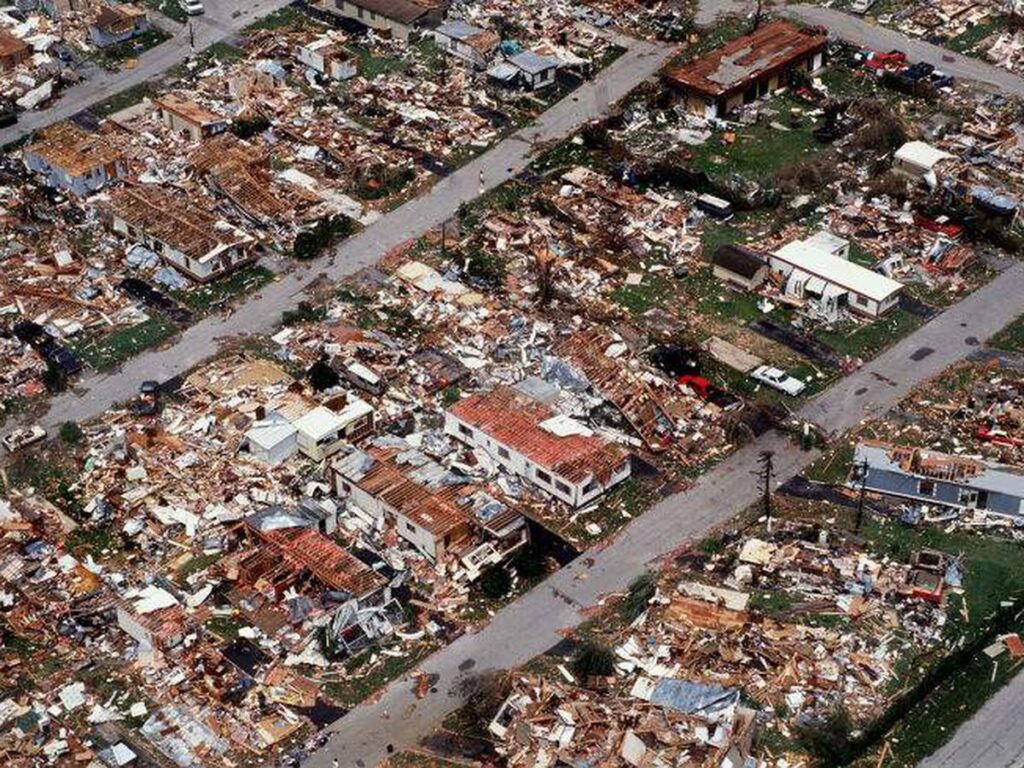Florida's current homeowners insurance crisis is decades in the making
Florida is heavily dependent on one insurance rating company. Why?
Oct. 26, 2022, 4:00 PM PKT
TALLAHASSEE — Florida’s collapsed homeowners insurance market exposes one of its long-standing flaws: Its dependence on a single company for certification of most of the state’s insurers.
The state regulators and the governor have been working together for several weeks to contain the fallout from Demotech Inc.’s primary rating agency in Ohio. The state regulators and Gov. Ron DeSantis have been trying to contain the fallout from Ohio’s primary rating agency Demotech Inc. warning of downgrades to approximately two dozen insurance companies.
The state’s housing market is a key pillar of Florida’s $1.2 trillion economy. A downgrade would have caused a collapse of its housing market. A million Floridians could find themselves in a difficult situation without the ratings. This could lead to a housing crisis that could have repercussions on the state’s $1.2 trillion economy.
Although state regulators claim they have prevented a disaster temporarily, observers are now questioning how it was managed and how the state can be so dependent on one company that few people have ever heard of.
“If this were a movie title it would be The Sum of all Fears’,” said Senator Jeff Brandes (R-St. Petersburg), who warned for years about the dangers of the state’s property and insurance markets collapsing.
The DeSantis administration devised a temporary solution to help insurers stay afloat. They used state-run agencies as support. It then went after Demotech and Joe Petrelli, its president and cofounder. They called them “rogue rating agencies” and asked federal officials not to ignore their actions.
Ghosts of Hurricane Andrew
This drama is not the only problem. The state had its worst insurance crisis since 1992’s Hurricane Andrew.
More than 400,000 Floridians had their policies canceled or not renewed in the past two years. Florida has seen the exit of 14 companies that have stopped issuing new policies. Five of the five have been declared bankrupt in 2022. Eight people have gone bankrupt in just one year, following Hurricane Andrew’s destruction.
Coral Gables-based Weston Property & Casualty suffered the latest loss. This leaves approximately 22,000 policyholders in South Florida scrambling for new insurance companies.
The cost of living has also risen. Floridians were paying an average premium in 2019 of $1,988 when DeSantis was elected. According to an Insurance Information Institute analysis, this year it is $4,231, which is triple the national average.
What are Floridians paying for homeowners insurance in 2022?
| Monroe | $6,729 |
|---|---|
| Miami-Dade | $5,093 |
| Palm Beach | $4,811 |
| Broward | $4,802 |
| Pinellas | $2,728 |
| Hillsborough | $2,302 |
The average annual homeowner’s insurance premium in Florida has increased by more than 112% since 2019. The highest rates are found in Monroe and Miami-Dade counties.
Source: Office of Insurance Regulation and Insurance Information Institute.
Experts say that today’s problems are rooted in many ways in the decisions made by regulators and lawmakers after Andrew.
The hurricane reshaped Florida’s insurance industry, causing several companies to go out of business and others fleeing the state. The legislature created the state-backed Residential Joint Underwriting Association, which was essentially a precursor to Citizens Property Insurance. It offered homeowners coverage that could not be provided by private insurers.
It quickly became the largest state-owned insurer, and there were concerns that it was taking too much risk. The state provided incentives to companies to assume its policies. A number of smaller insurers joined the ranks.
However, the new insurers were faced with a problem: They couldn’t get a financial stability rating by a qualified rating agency. Federally backed mortgage holders, such as Fannie Mae or Freddie Mac, must have high-rated property insurance companies to protect them.
Fannie and Freddie and state insurance regulators as well as banking regulators looked to different rating agencies for assistance. Only Demotech was willing rate the new insurers. Petrelli and Sharon Romano Petrelli, his wife, founded the company in Columbus, Ohio in 1985. Both Fannie and Freddie approved the company’s “A” rating.
Demotech has been Florida-based insurers’ primary rating agency since then. They dominate Florida’s market, and Demotech is paid to rate their financial strength. While other rating agencies, like AM Best in New Jersey, can provide ratings for certain insurers, none of them has been able to compete with Demotech.
According to Kevin McCarty (the state’s insurance commissioner between 2003 and 2016), Florida wouldn’t have an insurance marketplace without Demotech.
McCarty stated, “Regardless of your opinion on them, they serve an inestimable service to the state and the wider economy.”
‘We never got a phone call’
Florida’s dependence on smaller insurers has led to homeowners experiencing booms and busts.
Reinsurance, which is basically insurance for insurance companies, helps smaller insurers to weather Florida’s hurricanes. An insurer may be responsible for paying a few million dollars if a storm strikes, while the reinsurer will pay the rest.
Insurers and state regulators blame excessive lawsuits over the past few years. Petrelli has been a vocal critic of the inaction of the Legislature to curb litigation.
He cited data from Florida’s insurance commission that showed Florida was responsible for 7.75% to 16% of all homeowners’ claims in the United States, and 64% to 76% of all homeowners’ disputes. Critics claim that insurers have more problems.
DeSantis called for a special session to the Legislature in May to adopt insurance reforms that would stabilize the market and reduce lawsuits. But Petrelli stated it wasn’t enough.
Petrelli stated, “It didn’t deter us.”
Mark Friedlander, the communications director at the industry-backed Insurance Information Institute, stated that the response was unlike any he had ever seen. He said that rating agencies are neutral third parties that give ratings to companies.
Friedlander stated that the state’s response was “definitely, in our view, stepping over it.”
Petrelli, on the other hand “has pushed him further into the spotlight by publicly engaging in politics theater,” Florida Association of Insurance Agents stated in a memo distributed to the Office of Insurance Regulation.
In a memo, the association asked whether state insurers should leave Demotech. The memo raised concerns that Demotech can often downgrade a company days before it becomes insolvent.
The memo said that “That often begs question, ‘Does Demotech rating mean something or provide the intended peace-of-mind to consumers, agents, and lenders?’
Petrelli stated that companies should keep their “A”, rating for as long as possible because Fannie and Freddie don’t accept the “S”, rating despite Demotech making numerous attempts to convince them.
He said that when a company receives an “S”, they “unfortunately” fall off the cliff edge.
This is a very elegant solution
The letter from the Office of Insurance Regulation did not dispute the fact that Florida’s insurers were failing. It has 27 companies on its watch list that are subject to “enhanced surveillance.”
Patronis suggested that insurance companies should look for a new rating agency. Friedlander disagreed and said that it wouldn’t be feasible. He noted that AM Best, a New Jersey-based firm, has more stringent requirements than Demotech.
Six days later, state officials announced a solution in case the ratings of companies were downgraded.
Florida’s plan allows insurance companies that are financially sound but not yet receiving Demotech’s “A” rating to continue operating and providing coverage for people’s policies.
The long-running state program, the Florida Insurance Guaranty Association covers homeowners’ claims if they go under. It also covers the first tranche of any claims made by failed insurance companies. Anything over $500,000 for homes or $300,000 for condominium units would be paid by the citizens.
Handerhan described it as a “very creative and very elegant, very customer-centric” solution.
But it will satisfy federal mortgage holders?
Despite numerous calls and emails from the Times/Herald over the past week, representatives from Fannie Mae or Freddie Mac did not respond to Rubio’s inquiries. According to Rubio’s office, the Florida Housing Finance Agency did not respond either.
A spokesperson for the Office of Insurance Regulation stated that they are confident that the solution will be accepted.
Related articles



EXCLUSIVE – Florida’s seaside border crisis worsens as Keys migrant landings soar 450%



EXCLUSIVE – Florida’s seaside border crisis worsens as Keys migrant landings soar 450%

Deputies report that a dispute at a Halloween party in Thonotosassa results in deadly shootings






